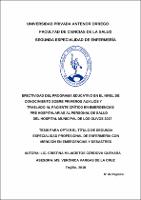Efectividad del programa educativo en el nivel de conocimiento sobre primeros auxilios y traslado al paciente crítico en emergencias pre hospitalarias al personal de salud del hospital municipal de los olivos 2017

Ver/
Descargar
(application/pdf: 1.159Mb)
(application/pdf: 1.159Mb)
Fecha
2020Autor(es)
Córdova Guevara, Cristina Milagritos
Metadatos
Mostrar el registro completo del ítemResumen
El presente estudio de tipo cuantitativo, tiene como objetivo determinar la
efectividad del Programa Educativo en el nivel de conocimiento sobre
primeros auxilios y traslado al paciente crítico en emergencias pre
hospitalarias del personal de salud del Hospital Municipal de los Olivos 2017.
La población del estudio estuvo conformada por 50 miembros que son
personal de salud entre médicos, enfermeras y personal técnico; a la vez el
tipo de muestreo fue no probabilístico. La muestra estuvo conformada por 44
miembros quienes son personal de salud y quienes cumplen con los criterios
de inclusión y exclusión. Los resultados al aplicar el pre test se obtuvo que el
26% del personal tiene un nivel de conocimiento bueno, el 45% un nivel de
conocimiento regular y el 29% manifiesta un nivel de conocimiento deficiente.
Al aplicar el post test se obtuvo como resultado que el 93% del personal de
salud tiene un nivel de conocimiento bueno, el 7% un nivel de conocimiento
regular. Al realizar la comparación entre el pre test y post test se aprecia que
el nivel de conocimiento bueno se incrementó de manera importante en el
personal de salud. The objective of this quantitative study is to determine the effectiveness of the
Educational Program in the level of knowledge about first aid and transfer to
the critical patient in pre-hospital emergencies of health personnel of the
Municipal Hospital of Los Olivos 2017.
The study population consisted of 50 members who are health personnel
including doctors, nurses and technical personnel; at the same time the type
of sampling was not probabilistic. The sample consisted of 44 members who
are health personnel and who meet the inclusion and exclusion criteria. The
results when applying the pre-test obtained that 26% of the staff have a good
level of knowledge, 45% a level of regular knowledge and 29% show a poor
level of knowledge. When applying the post test, it was obtained that 93% of
health personnel have a good level of knowledge, 7% a level of regular
knowledge. When comparing the pretest and posttest, it can be seen that the
level of good knowledge increased significantly in health personnel.

